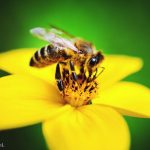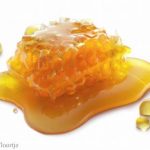Honeybees are crucial to the growth of many of the foods we eat. But their populations are in steep decline. Many experts think that neonicotinoids, a class of pesticides, are having acute and chronic effects on honeybees. These chemicals are slow to break down, meaning they build up in the environment. A new nationwide study released by the U.S. Geological Survey shows widespread detection of neonicotinoid insecticides in U.S. streams. At least one neonicotinoid was found in 53% of the stream samples collected around the country. Larissa Walter, pollinator campaign director at Center for Food Safety said in a statement, "It is clear that the problems with widespread uses of neonicotinoids extend well beyond the impacts to pollinators. This study shines a light on the alarming … [Read more...]
USDA Providing $4 Million for Honey Bee Habitat
Honey bees around the world have been dying off at an alarming rate in recent years. Because the insect is so important to America's food supply, the USDA is giving five midwestern states $4 million to help farmers and ranchers improve honey bee health. Agriculture Secretary Tom Vilsack said, "the future of America's food supply depends on honey bees, and this effort is one way USDA is helping improve the health of honey bee populations. Significant progress has been made in understanding the factors that are associated with Colony Collapse Disorder and the overall health of honey bees, and this funding will allow us to work with farmers and ranchers to apply that knowledge over a broader area." The Midwest is home to more than 65% of the commercially managed honey bee hives in the … [Read more...]
FDA Publishes Guidance Document for Honey Labeling
The FDA is cracking down on honey labeling, issuing a guidance document that will require companies to label honey that is not 100% honey as "blend of sugar and honey" or "blend of honey and corn syrup". The American Beekeeping Federation and other honey associations have been advocating for this change for years. That organization submitted a citizen petition in 2006 asking that the FDA adopt a U.S. standard of identify for honey. Often products that are labeled as "honey" contain other sweeteners, which some believe is food fraud. Honey is made of glucose and fructose, along with minerals such as iron, potassium, magnesium, and calcium. Honey has antiseptic an antibacterial properties and is a natural anti-inflammatory, while sugar is considered inflammatory. In addition, products … [Read more...]
MN Beekeepers Asking Ag Officials To Stop Treated Corn Seeds
A group of beekeepers in Minnesota is concerned about the effect of corn seeds treated with neonicotinoid pesticides on bees, according to MPR. They have been reported mortality events among bees at corn seeding time. The dust is coming off the seeds and poisoning honey bees. More than 1/3 of the country's honey bee population has died every year for the last several years. The group has also sued the EPA for not acting on the pesticides, which many think are causing massive bee die-offs in recent years. The Minnesota Department of Agriculture is currently reviewing neonicotinoids for their effects on bees. The National Honey Bee Advisory Board, which is working to try to find a solution to this problem, is conducting risk assessment around the country. But since pesticide … [Read more...]
Center for Food Safety Fighting Sulfoxaflor, a Bee Killer
Without bees, many of the foods we regularly eat and enjoy would disappear off the face of the earth because they must be pollinated before they can produce fruit. Honey bees are dying at an alarming rate. Scientists are blaming a group of insecticides called neonicotinoids. Unfortunately, the EPA has decided to register sulfoxaflor, a new neonicotinoid. The Center for Food Safety has filed a legal brief on behalf of many consumer and environmental groups against this decision. The brief states, "scientists have linked the drastic declines in honey bee and other pollinator populations to systemic pesticides known as neonicotinoids. Sulfoxaflor is a systemic pesticide with the same mode of action as neonicotinoids, that EPA determined is 'very highly toxic' to bees." The CFS brief … [Read more...]






